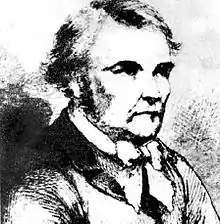Denis Vrain-Lucas
Denis Vrain-Lucas (1818–1882) was a French forger who sold counterfeit letters and other documents to French manuscript collectors. He even wrote purported letters from biblical figures in French.

Denis Vrain-Lucas was trained as a law clerk, but by 1854 he had begun to forge historical documents, especially letters. Lucas began by using writing material and self-made inks from the appropriate period and forged mainly documents from French authors. He collected historical details from the Imperial library. As his forgeries were more readily accepted, he began to produce letters from historical figures.
In 1861 Vrain-Lucas approached French mathematician and collector Michel Chasles and sold him forged letters for Robert Boyle, Isaac Newton and Blaise Pascal. In one of them Pascal supposedly claimed that he had discovered the laws of gravity before Newton. Since this would have meant that a Frenchman would have discovered gravity before an Englishman, Chasles accepted the letter and asked for more. Lucas proceeded to sell him hundreds of letters from historical and biblical figures, using contemporary French.
Over 16 years Vrain-Lucas forged total of 27,000 autographs, letters, and other documents from historical figures including Mary Magdalene, Cleopatra, Judas Iscariot, Pontius Pilate, Joan of Arc, Cicero and Dante Alighieri - written in contemporary French and on watermarked paper. The most prominent French collectors bought them, helping Lucas accumulate a significant wealth of hundreds of thousands of francs.
In 1867 Chasles approached the French Academy of Science, claiming to have proof that Pascal had discovered gravity before Newton. When he showed them the letters, scholars of the Academy noticed that the handwriting was very different compared to letters that were definitely by Pascal. Chasles defended the letters' authenticity but was eventually forced to reveal that Vrain-Lucas had sold them to him.
When Academy members complained about the anachronisms in the letters, Vrain-Lucas had to forge more letters to explain away his earlier mistakes. Debate continued on to 1868 and the next year he was arrested for forgery. In the following trial Chasles had to testify how he had been duped, how he had purchased large numbers of other forged letters and how he had paid total of 140,000-150,000 francs for them.
In February 1870, the Correctional Tribunal of Paris sentenced Vrain-Lucas to two years in prison for forgery. He also had to pay a fine for 500 francs and all legal costs. Chasles received no restitution for all the money he had wasted on the Vrain-Lucas forgeries. After his sentence Lucas disappeared from the public eye. In 2004, the journal Critical Inquiry published a recently "discovered" 1871 letter written by Vrain-Lucas (from prison) to Chasles, conveying Vrain-Lucas's perspective on these events,[1] itself an invention.[2]
Notes
- Ken Alder, "History's Greatest Forger: Science, Fiction, and Fraud Along the Seine," Critical Inquiry 30 (Summer 2004):704-716.
- Anne H. Stevens, Forging Literary History: Historical Fiction and Literary Forgery in Eighteenth-Century Britain, Studies in Eighteenth-Century Culture: Volume 37, Johns Hopkins University Press, Mar 18, 2008.
References
- Bordier, Henri Leonard, and Emile Mabille. Une Fabrique de Faux Autographes, Ou Recit de L'Affaire Vrain Lucas. Paris, 1870. (published in English as The Prince of Forgers)
External links
| Wikimedia Commons has media related to Denis Vrain-Lucas. |
- "Of Literary Forgers", Charles Whibley in Cornhill Magazine, Vol. 85, 1902, pp. 624–636